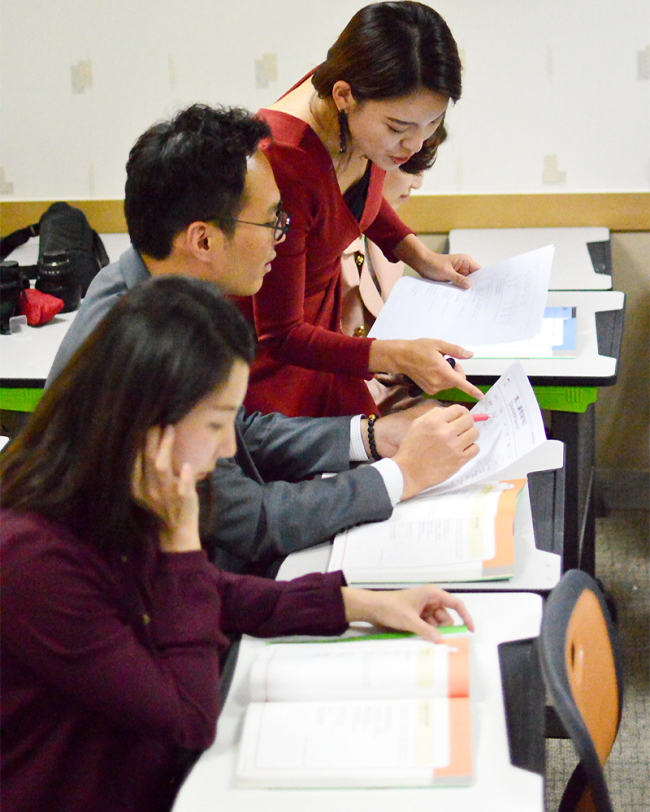As China rises as the prime candidate to be the world’s next superpower, an increasing number of people in Korea are learning Chinese.
The tendency for both children and adults to study the language continues to grow as bilateral cooperation between Korea and China remains strong.
The market for Chinese language education has been growing by some 20 percent annually for the past 10 years, according to officials from local education firm YBM. The overall amount spent on Chinese lessons in 2013 is estimated at 500 billion won to 600 billion won ($465 million to $560 million), and online education accounts for roughly 20 percent of that.
The number of Koreans taking the HSK ― the official Chinese proficiency test ― has also climbed consistently to exceed 110,000 last year, about 31.5 percent of the total number of applicants. It marked an exponential increase from 400 applicants in 1993, when the test was first conducted in Korea.
The tendency for both children and adults to study the language continues to grow as bilateral cooperation between Korea and China remains strong.
The market for Chinese language education has been growing by some 20 percent annually for the past 10 years, according to officials from local education firm YBM. The overall amount spent on Chinese lessons in 2013 is estimated at 500 billion won to 600 billion won ($465 million to $560 million), and online education accounts for roughly 20 percent of that.
The number of Koreans taking the HSK ― the official Chinese proficiency test ― has also climbed consistently to exceed 110,000 last year, about 31.5 percent of the total number of applicants. It marked an exponential increase from 400 applicants in 1993, when the test was first conducted in Korea.

According to a local daily, the percentage of high schools that teach Chinese increased from 8.8 percent in 2000 to 36.8 percent in 2012, not counting foreign-language schools. This was in stark contrast with German and French, which respectively fell from 36.2 percent and 22 percent to 4 percent and 5.1 percent during the same period.
“A few years back, most people wanted to learn Chinese because they had specific goals such as going to foreign schools, or because it was their major. But now, many people are seeking to learn practical Chinese to use in their daily lives,” said Kim Ki-young from the marketing team of local education firm YBM. “This is having a profound impact on the education market in general, and the rise of Chinese education is expected to continue for a while.”
The substantial growth of Chinese education is attributed in part to more adults taking Chinese lessons. A 28-year-old office worker surnamed Kim said she started to learn Chinese because she hoped it would help her in her job.
“My work does not require me to speak Chinese right now, but being able to speak the language could help me grab opportunities like promotions,” she said. Having a score in Chinese proficiency might also give her a leg up when finding a new job, she added.
For job seekers, proficiency in the language can be a useful credential in the job market. Samsung Group, the largest and most influential conglomerate in Korea, started this year to give extra credit for applicants with a certified Chinese score. Other companies like CJ Group and LG Chem followed suit.
The jump in the number of tourists from the neighboring country is also fueling the trend.
Korea’s tourism income topped $1.76 billion in September to mark an all-time high, thanks to 4.68 million Chinese people who visited the country in the first nine months of the year. About 38 percent more Chinese tourists are estimated to have visited Korea during China’s National Day holiday in early October than the same period last year.
Jeon Jong-gyu of Samsung Securities said in his recent report that the annual number for Chinese tourists was expected to top 10 million by 2018, with them spending roughly 30 trillion won ($28.1 billion).
Moon Jung-a, a private educator, said in a recent interview that the number of people studying Chinese has increased on account of the rise in Chinese tourists. In addition, Korean enterprises are looking for opportunities in the vast market in China, which further fuels the desire to learn the language, she said.
Responding to the rising demand, local education firms are doubling efforts to extend their related programs.
In September, YBM opened a five-story educational facility in Jongno, central Seoul that specializes only in Chinese. Hackers Education Group opened a website last year to provide various content related to studying the language.
Some like NHN Corp. recently released mobile applications that will help office workers use the mobile applications to find time to study between working hours.
By Yoon Min-sik (minsikyoon@heraldcorp.com)


![[Exclusive] Korean military set to ban iPhones over 'security' concerns](http://res.heraldm.com/phpwas/restmb_idxmake.php?idx=644&simg=/content/image/2024/04/23/20240423050599_0.jpg&u=20240423183955)

![[Graphic News] 77% of young Koreans still financially dependent](http://res.heraldm.com/phpwas/restmb_idxmake.php?idx=644&simg=/content/image/2024/04/22/20240422050762_0.gif&u=)



![[Pressure points] Leggings in public: Fashion statement or social faux pas?](http://res.heraldm.com/phpwas/restmb_idxmake.php?idx=644&simg=/content/image/2024/04/23/20240423050669_0.jpg&u=)










